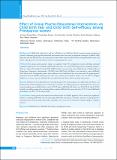Please use this identifier to cite or link to this item:
https://hdl.handle.net/20.500.14356/2289Full metadata record
| DC Field | Value | Language |
|---|---|---|
| dc.contributor.author | Bista, Archana Pandey | - |
| dc.contributor.author | Shrama, Chandrakala | - |
| dc.contributor.author | Shrestha, Uma | - |
| dc.contributor.author | Timalsina, Punjita | - |
| dc.contributor.author | Devkota, Kavita | - |
| dc.contributor.author | Piya, Kalpana | - |
| dc.contributor.author | Neupane, Beena | - |
| dc.date.accessioned | 2023-07-30T09:15:02Z | - |
| dc.date.available | 2023-07-30T09:15:02Z | - |
| dc.date.issued | 2022 | - |
| dc.identifier.citation | Pandey BistaA., ShramaC., ShresthaU., TimalsinaP., DevkotaK., PiyaK., & NeupaneB. (2023). Effect of Group Psycho-Educational Interventions on Child birth fear and Child birth Self-efficacy among Primiparous women. Journal of Nepal Health Research Council, 20(4), 846-851. https://doi.org/10.33314/jnhrc.v20i4.4028 | en_US |
| dc.identifier.issn | Print ISSN: 1727-5482; Online ISSN: 1999-6217 | - |
| dc.identifier.uri | https://hdl.handle.net/20.500.14356/2289 | - |
| dc.description | Original Article | en_US |
| dc.description.abstract | Abstract Background: Child birth related fear and low self-efficacy for child birth found common among primiparous women. Antenatal group psycho-educational interventions have been used as important strategies to address child birth fear and self-efficacy. Thus, this study aimed to find out the status of child birth fear among antenatal women and effect of group psycho-educational interventions among primiparous women. Methods:One group pretest-posttest design was adopted. Total 307 primigravida women attending antenatal outpatient department of two hospitals within Kathmandu valley were selected through purposive sampling technique. Data was collected from March to July 2020. Child birth fear was assessed by using validated tool i.e.Wijma Delivery Expectancy/Experience Questionnaire (W-DEQ) and Child birth self-efficacy was assessed by using childbirth self- efficacy tool. Primigravida women with moderate level of child-birth fear, were intervened for group psycho-education based on PRIME Model by nurses who were research team members. Paired t-test was used to compare differences in mean scores on child birth fear and child birth self-efficacy before and after intervention. Results: Moderate level of child birth fear was found among 24.8% of participants. Low child-birth self-efficacy was found among 42.0% participants. The overall mean score before providing group psycho-educational interventions to experimental group on child-birth fear was 54.0±2.09 and on child birth self-efficacy was 78.0±28.64 with p<0.001 and after providing group psycho-educational interventions child-birth fear was reduced to 47.8±2.44 and child birth self-efficacy was 105.2±19.6 with p<0.001. Conclusions: Group psycho-educational interventions based on PRIME approach led by nurses have significant effects in reducing child-birth fear and increasing child-birth self-efficacy. Therefore, provision of group psycho-educational interventions along with routine antenatal service need to be considered in clinical settings in Nepalese context. Keywords: Child birth fear; child birth self-efficacy; primiparous women | en_US |
| dc.language.iso | en | en_US |
| dc.publisher | Government of Nepal; Nepal Health Research Council; Ramshah Path, Kathmandu, Nepal | en_US |
| dc.relation.ispartofseries | Oct-Dec, 2022;4028 | - |
| dc.subject | Child birth fear | en_US |
| dc.subject | Child birth self-efficacy | en_US |
| dc.subject | Primiparous women | en_US |
| dc.title | Effect of Group Psycho-Educational Interventions on Child birth fear and Child birth Self-efficacy among Primiparous women | en_US |
| dc.type | Journal Article | en_US |
| Appears in Collections: | Vol 20 No 04 Issue 57 Oct-Dec, 2022 | |
Files in This Item:
| File | Description | Size | Format | |
|---|---|---|---|---|
| 4028-Manuscript-32160-1-10-20230720.pdf | Fulltext. | 290.44 kB | Adobe PDF |  View/Open |
Items in DSpace are protected by copyright, with all rights reserved, unless otherwise indicated.
